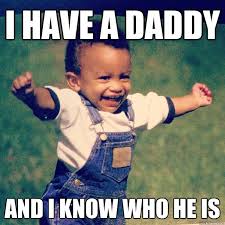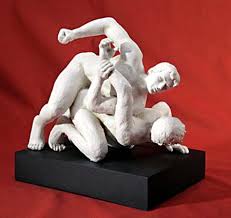Extrajudicial writings describing actual court cases disguised as fiction - Part Three
In his fictional autobiography, Judge Timothy Philpot discusses many
real life events both outside and within his courtroom including descriptions
of actual cases. Listed below are the
third set of disguised characters and clues about their actual identities
21. JANET GUY AND DARIUS BARNHART
Disguised characters: Janet Guy and Darius Barnhart
Background: Janet and Darius are Paternity Court litigants. Janet is
described as “A typical young lady who got pregnant and became eligible for
government benefits and knew the father was in jail. A drug addict, with six
kids by five women. She never planned to be anything other than a single
mother, just like her own mother." Paternity confirmation is needed in
order to obtain government benefits and DNA testing shows
that Darius Barnhart is
Janet’s “latest baby daddy”. Darius claims he is unable to pay child
support which caused the judge to muse on the absence of black responsibility:
“On some days the sadness was overwhelming. When most or all of the men in
orange jail jumpsuits were African-American, the judge would ask himself, Where
are all the black pastors? What happened in the African-American culture that
led to this day, when nobody seems to be married, children are born to single
moms and the fathers are not working, not educated, and often not caring?
Where’s Jesse Jackson? Where’s Al Sharpton? Is this my fault? Am I a racist for
even having these thoughts?”
22. DEJUAN WILDER AND HIS GIRLFRIEND
Disguised characters: DeJuan
Wilder and his girlfriend
Background: DeJuan Wilder is a litigant in Dependency, Abuse and
Neglect Court. He petitions the judge
"Hoping to get custody of his daughter. He’d just gotten out of prison,
but since the mother was on drugs and the child was in foster care, he appeared
to be a decent alternative—until more facts came out. Judge Z decided to drug
test him, and when he was asked who he lived with, he pointed out his
girlfriend in the courtroom. She would need to be drug tested." DeJuan's
white girlfriend is understandably upset at being targeted for drug
testing accuses the judge of being
racist. The judge cannot understand how another white person could have standing
to call him racist:
“Judge Z thought that was odd, since she was as white as he was, but he
brought her back into court and asked her if she would rather apologize or go
to jail. She reluctantly mumbled “I’m sorry” and the overcrowded jail was
spared one more big mouth to feed.”
23. ABORTION PROMOTERS IN FAMILY COURT
Disguised characters: Laura Mahoney, Louisa Franke, Rachel Fielding and
unnamed legal aid clinic supervisor (Court officers and social workers
conspiring to promote abortions in family court)
Background: In the book, the judge is strongly pro-life. He has
attended demonstrations and been disciplined for showing gory ant abortion
videos to pregnant teenagers. He even slips pro-life helpdesk numbers to women
considering abortion, in his courtroom. It is inevitable therefore that he
eventually clashes with female judge Robin Newton who is "staunchly and
openly pro-abortion.” She is the preferred choice of social workers seeking
“judicial bypass’ for minor girls who want an abortion without getting their
guardian’s permission. Judge Philpot’s
alter ego stumbles upon the racket when the female judge goes on vacation
without covering her tracks, and he is called to preside over the case of Ivory
Smith, a poor, black, drug-using teenager. Laura Mahoney is Ivory’s Legal Aid
attorney who attempts to arrange an abortion for Ivory but is foiled by the
judge after he manages to persuade Ivory’s grandmother to withhold permission.
Not content with getting his way, the furious judge launches something of a
witch-hunt to identify abortion friendly people in his court. He upbraids Louisa
Franke, Ivory’s social worker and Rachel Fielding, a prosecutor for status
court who denies complicity, as an innocent bystander. The judge circles back
to Laura Mahoney who is forced to seek help from her supervisor at the legal
aid clinic, a bow-tie wearing man in his fifties who coaches Laura in reminding the judge that:
“I know that conversations with my client are privileged. And I know
abortion is legal. And I know that this court is not supposed to consider
evidence of what happened in conversations in a courthouse hallway.”
These reminders of due process and court rules seem to come as
something of a shock to the judge:
“Judge Z was surprised. Her boss, a more seasoned lawyer, had given her
good answers. The judge was now on the defensive. He took his time.”
24. BARRY MURDOCK, HIS DAUGHTER SERENA MURDOCK AND HER BOYFRIEND SAM
Disguised characters: Barry Murdock, his daughter Serena Murdock and
her boyfriend Sam
Background: Serena, a twenty-six year old mother of a six-year-old boy,
is a litigant in the judge’s Drug Court. The judge recognizes her as the
daughter of an old friend, Barry Murdock who “had quit drinking and drugging,
had been to AA meetings every night for a year and Jesus was now his Higher
Power”.
Unfortunately, Serena’s familial drug habit had forced the judge take
her son, Ray, away from her two years prior. “The father was missing, of
course. She was on probation for various drug offenses, but drug court had
saved her life. “
Serena and her boyfriend are one of only two couples who receive
redemption in the autobiography. The dozens of non-redeemable characters are
virtually all minority, non-Christians who are relegated to damnation and
continued suffering.
To earn her favored status, Serena forgoes an abortion after being handed
a pro-life helpline phone number by the judge in court. She then pays homage by
attending the funeral for the judge’s mother and marrying Sam. Serena and Sam show
their gratitude by changing their daughter’s name to that of the judge’s mother
and live happily ever after.




Comments
Post a Comment